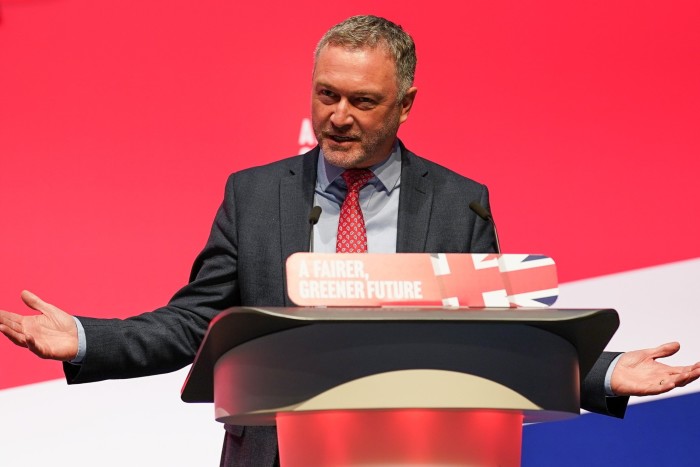
Morgan McSweeney is already thinking about the next election.
Labour’s influential campaign manager will begin a data-heavy review of the party’s performance within days of Thursday’s ballot, whether or not it sweeps to the resounding victory suggested by the polls.
The project, working alongside think-tank Labour Together, aims to prepare Sir Keir Starmer’s party for the challenging years of government ahead if elected — and to chart a course to win a potential second election, likely in 2029.
The influential “data nerd” has told allies that political parties only analyse their mistakes when they lose. “He’ll say that everyone assumes that if you win an election it’s because you did everything right, whereas there are always lessons to be learned,” says one colleague.
If elected, Starmer wants a “decade of renewal” to implement a slew of reforms to the UK.
Yet colleagues say McSweeney — a softly spoken yet intense Irishman — is alive to the challenges facing a potential Labour government if it wins off the back of a collapse in Conservative support.
“He gets that if Labour wins big it will be because people lent them their vote and that the degree of electoral volatility — driven by a lack of party loyalty — makes it a challenge to hold on to those voters,” says one Labour thinker.
Even now, rival polls show a wide potential disparity, between a modest Labour majority and a record-breaking landslide. There are scores of seats that will be decided by just a handful of votes.
McSweeney is “obsessed” with the question of vote canvassing and whether it is being done by the party in the right places.
“He looks at graphs from each election to see whether people were deployed to safe Labour seats or to safe opposition seats when they could have been sent to actual marginals . . . the places that are most useful,” says one Labour figure.
McSweeney’s ascent to the head of campaigns caps a career working for or around the party.
He worked for Labour in the early 2000s and in 2006 became a campaign aide to Steve Reed, a local party leader in Lambeth in south London.

During one campaign, he brought a camp bed to work so he could sleep in the office. A girlfriend at the time brought his birthday cake to the office, one colleague recalls.
After Reed co-founded a new think-tank called Labour Together he brought in McSweeney in 2017 as its director. The group became instrumental to efforts by centrist Labour figures to wrest control of the party from the “hard left” personified by then-leader Jeremy Corbyn.
At the time the moderate wing was in disarray with Sir Tony Blair, the thrice-election winning former leader, among those who thought the party was permanently lost to the Corbyn fringe.
McSweeney used opinion polls and focus groups of the membership to deduce that Starmer was perhaps the only moderate Labour MP who could win a post-Corbyn leadership race.
“He realised that new members back then weren’t different from people who have always been Labour members, they’re just Guardian readers who have . . . strong feelings rather than deep ideology,” says one colleague.
Since working on Starmer’s successful leadership race, McSweeney has played a pivotal role in the reshaping of the party’s internal institutions at the expense of left-wingers. Some colleagues expect the so-called “hammer of the Trots” to float further changes to Labour’s rules to further lock out the hard left in future.
Kevan Jones, the former MP for North Durham, said: “Morgan is a driven individual who ruffles feathers and isn’t everyone’s cup of tea but he gets the job done, the results speak for themselves, he knows what he’s doing whatever people think of him.”
The pre-election removal of some left-wing candidates is widely seen as a signal that members of the Socialist Campaign Group could face further attrition in the coming parliament.
Today, he runs campaign operations from the centre of the party’s open-plan offices in Southwark alongside Pat McFadden, the MP who is election co-ordinator.

With Starmer’s party so far ahead in the polls ahead of Thursday’s ballot, McSweeney has been one of the voices of caution inside the party, urging colleagues to ignore the opinion polls that predict a thumping Labour win.
“He’s always saying you have to treat every election like it’s neck and neck,” says one Labour MP. “He will say that right until the very end.”
Victory would mean vindication for McSweeney’s strategy since 2019 when Labour crashed to its worst result in 80 years.
He is expected to take up a job in Downing Street as either political secretary or director of political strategy, with a particular focus on advising leader Starmer on how to be a “campaigning government”, according to one Labour figure. “He’ll be thinking nonstop how to get a second term.”
While Labour is ahead in the polls, Starmer’s personal approval rating remains in negative numbers, while research has shown most voters expect the next government to raise taxes to grapple with the nation’s poor public finances.
The party also faces a potential “internal schism” after the election that could see its MPs facing pressure from both left and right. While some Labour MPs in “red wall” seats could see Reform UK coming in second place, other Labour MPs elsewhere could have the Scottish National party, Greens or Liberal Democrats breathing down their necks. “You can see how that would involve various policy trade-offs,” said one Labour figure.
Colleagues describe a figure who is prepared to listen to others and learn from their expertise — although he has become increasingly “more assertive” in meetings — with a political network that has become increasingly “global”.
But despite his ruthless approach to politics he is kind to staff, says a Labour figure: “He has this image as an evil genius but he’s incredibly nice to people he works with, when you’re under that much pressure . . . it’s impressive that he doesn’t act like a wanker.”
Sue Gray, Starmer’s chief of staff, will hold the reins inside a Labour government if the party wins the election — leaving McSweeney to focus on long-term political strategy.
He tries to ignore political froth and focus instead on the needs and interests of voters — an approach reminiscent of Dominic Cummings, the mercurial former Tory strategist.
“His strength is that he understands the contours and mental make-up of the Labour party but he also understands voters,” says one ally. “He believes that politicians should be vehicles to represent people rather than just handing out answers from above.”